(!) Since support from Microsoft will end on January 14th, 2020, Windows 7 will be excluded from the recommended environment from December 15th, 2019 on this site. Vì lý do Microsoft kết thúc hỗ trợ cho Windows 7 vào ngày 14/01/2020, Windows 7 sẽ là hệ điều hành không được khuyến khích sử dụng với trang web này từ ngày 15/12/2019.
Search by Category / Brand Tìm theo danh mục, nhãn hiệu
Search by Category Tìm theo danh mục
- Scheduled Maintenance Notice: This site will be unavailable due to scheduled maintenance from 8:00 24/11/2024 to 6:00 (ICT) 25/11/2024. We apologize for the inconvenience.
- [Thông báo] Cập nhật địa chỉ kho tập kết hàng hóa tại khu vực miền Nam của MISUMI Việt Nam. Xem chi tiết.
[Announcement] Update on warehouse address in the Southern region of MISUIMI Vietnam. See more. - [Cảnh Báo] Thủ Đoạn Lừa Đảo Từ Nhân Viên Giao Hàng – Yêu Cầu Trả Phí Ship. Xem chi tiết.
[Warning] Fraud Calling from Shipper - Asking to Pay Shipping Fee. See more.
TAKIGEN Hinges(Main Body Type:Rotary Type)
Search by specifying the lower class categoryTìm kiếm bằng cách chỉ định danh mục lớp thấp hơn
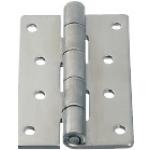 Flat Hinges
Flat Hinges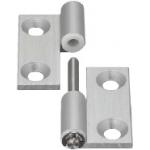 Detachable Hinges
Detachable Hinges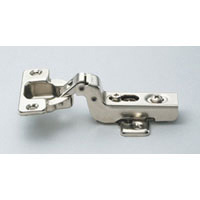 Concealed Hinges
Concealed Hinges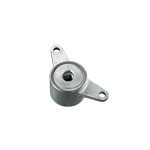 Damper Hinges, Spring Hinges
Damper Hinges, Spring Hinges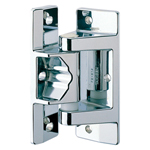 Other Hinges and Nuts for Hinge
Other Hinges and Nuts for Hinge
Brand |
|
|---|---|
Filter By |
|
| CAD |
|
| Days to Ship |
|
2 itemsMặt hàng
- Sort By
-
You can add up to 6 items per a category to the compare list.
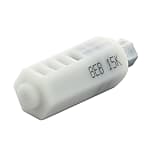

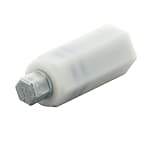
Rotary Damper (BP-879 / Plastic)
TAKIGEN
[Features]· Appropriate damper characteristics can be obtained within the rotation range (in the direction of the arrow) of 180° (rotation in the reverse direction of the arrow is no load).· Due to the compact hexagonal shape, setting it into the door is easy.· Damper characteristics: closing time 10 ± 5 seconds.· In a tolerance test of 100,000 repetitions (at normal temperature), closing time is more than 2.5 seconds.
Length L(mm) Flat Hinge Type Width W(mm) Body Material Main Body Type Operating Environment Mounting Method Additional Function Mounting Screw Hole Type Detachable, Flag Hinge Type Main Body Surface Treatment Reversed 48 - 16 Resin Rotary Type Standard - With Damper - - Not Provided For Right Side / For Left Side From: 273,310 VND Days to Ship: Số ngày giao hàng: Same day or more  Same day or more
Same day or more
-
You can add up to 6 items per a category to the compare list.

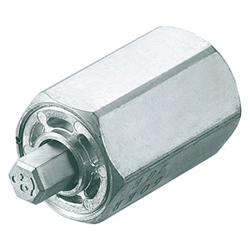

Rotary Damper (B-879 / Zinc Alloy)
TAKIGEN
Correct damper characteristics can be obtained within the rotation range of 180°.Due to its compact hexagonal shape, setting it into the door is easy.[Features]<B-879-0>· Damper characteristics: closing time 5 ± (2.5 seconds).· In a tolerance test of 100,000 repetitions, closing time is more than 1.5 seconds.<B-879-1>· Correct damper characteristics can be obtained within the rotation range (in the direction of the arrow) of 180° (rotation in the reverse direction of the arrow is no load).· Due to the compact hexagonal shape, setting it into the door is easy.· Damper characteristics: closing time 10 ± 5 seconds.· In a tolerance test of 100,000 repetitions (at normal temperature), closing time is more than 2.5 seconds.
Length L(mm) Flat Hinge Type Width W(mm) Body Material Main Body Type Operating Environment Mounting Method Additional Function Mounting Screw Hole Type Detachable, Flag Hinge Type Main Body Surface Treatment Reversed 48 ~ 52 - 16 ~ 26 Zinc Alloy Rotary Type - - - - - Not Provided For Right Side / For Left Side / For Both Right and Left Sides From: 350,560 VND Special Price Days to Ship: Số ngày giao hàng: Same day  Same day
Same day
| BrandNhãn hiệu |
|---|
| Product SeriesDòng sản phẩm |
| CADCAD |
| From |
| Days to ShipSố ngày giao hàng |
| Length L(mm) |
| Flat Hinge Type |
| Width W(mm) |
| Body Material |
| Main Body Type |
| Operating Environment |
| Mounting Method |
| Additional Function |
| Mounting Screw Hole Type |
| Detachable, Flag Hinge Type |
| Main Body Surface Treatment |
| Reversed |
You can add up to 6 items per a category to the compare list. | You can add up to 6 items per a category to the compare list. | |
| BrandNhãn hiệu | TAKIGEN | TAKIGEN |
| Product SeriesDòng sản phẩm | ||
| CADCAD |
|
|
| From | 273,310 VND- | 350,560 VND Special Price On Sale Till 31/03/2025 |
| Days to ShipSố ngày giao hàng | Same day or more | Same day |
| Length L(mm) | 48 | 48 ~ 52 |
| Flat Hinge Type | - | - |
| Width W(mm) | 16 | 16 ~ 26 |
| Body Material | Resin | Zinc Alloy |
| Main Body Type | Rotary Type | Rotary Type |
| Operating Environment | Standard | - |
| Mounting Method | - | - |
| Additional Function | With Damper | - |
| Mounting Screw Hole Type | - | - |
| Detachable, Flag Hinge Type | - | - |
| Main Body Surface Treatment | Not Provided | Not Provided |
| Reversed | For Right Side / For Left Side | For Right Side / For Left Side / For Both Right and Left Sides |
Loading...Tải…
ConfigureTạo
Specification/DimensionsĐặc điểm kỹ thuật / Kích thướcĐặc điểm kỹ thuật / Kích thước
-
Length L(mm)
- 2,000
- 6
- 6.5
- 17
- 18
- 19
- 20
- 22
- 23.5
- 24
- 25
- 25.5
- 25.6
- 26
- 27.5
- 29
- 30
- 30.5
- 31
- 31.5
- 32
- 32.5
- 33
- 34
- 35
- 36
- 37
- 38
- 39.2
- 39.5
- 40
- 40.5
- 41
- 42
- 43
- 44
- 45
- 46
- 47
- 48
- 48.5
- 49
- 49.5
- 50
- 50.5
- 51
- 52
- 53
- 53.5
- 54
- 54.5
- 55
- 56
- 57
- 59
- 60
- 61
- 62
- 63
- 63.4
- 63.5
- 64
- 65
- 66
- 67
- 68
- 70
- 71
- 71.7
- 72
- 73
- 75
- 75.5
- 76
- 76.5
- 76.7
- 77
- 78
- 79
- 80
- 81
- 81.7
- 81.8
- 82
- 83
- 84
- 85
- 86
- 86.7
- 87
- 87.5
- 88
- 89
- 90
- 92
- 93
- 94
- 94.5
- 95
- 95.3
- 96
- 96.5
- 100
- 101
- 101.2
- 101.5
- 101.7
- 102
- 103
- 104
- 106
- 107
- 108
- 109
- 110
- 113
- 114
- 114.5
- 115
- 117.5
- 118
- 120
- 121
- 123
- 124
- 125
- 126
- 126.5
- 127
- 128
- 130
- 132
- 132.5
- 138
- 139
- 139.7
- 140
- 144
- 145
- 148
- 149
- 150
- 151
- 152
- 152.5
- 153
- 154
- 155
- 158
- 160
- 161
- 161.5
- 162
- 170
- 183
- 184
- 186
- 186.4
- 190
- 200
- 201
- 204
- 210
- 216
- 222.3
- 224
- 225
- 250
- 258
- 264
- 277
- 289.3
- 300
- 340
- 350
- 400
- 442
- 450
- 476
- 576
- 600
- 626
- 750
- 850
- 900
- 1000
- 1200
- 1800
- 1829
- 1872
- 2000
- 2133
- 2400
- 2500
-
Flat Hinge Type
-
Square Plate Type
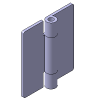
-
Round Plate Type
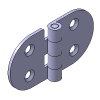
-
Parallel Type
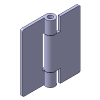
-
Stepped Type (One Way Foldable)

-
Stepped Type (Both Way Foldable)

-
Long Hinges

-
Machine Type

-
Square Plate Type
-
Width W(mm)
-
Body Material
- Stainless Steel
- Steel
- Brass
- Aluminum
- Zinc Alloy
- Resin
- (Data Cleansing for MDM2.0)
- (Data Cleansing for MDM2.0)2
- (Data Cleansing for MDM2.0)4
- STS304(Data Cleansing for MDM2.0)
-
Main Body Type
-
Flat Hinges
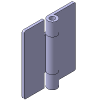
-
Detachable, Flag Hinge
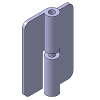
-
Free Spring Hinges

-
Concealed Hinge, Hidden Hinge
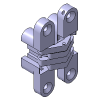
-
Pivot Type

-
Rotary Type

-
Leaf Type
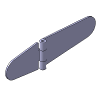
-
Special Shape
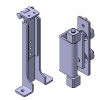
-
Damper/Torque/Spring Hinge

-
Glass Hinges

-
Related Components

- 표준
-
Flat Hinges
-
Operating Environment
- Standard
- Corrosion Resistance
- Abrasion Resistance
- Cleanroom
-
Mounting Method
-
Additional Function
- Not Provided
- With Damper
- With Stopper
- With Catches
- Bearing Built-in
- With Torque Function
- With Click Function
- Spring Built-in
- With Fixing Function
- Others
-
Mounting Screw Hole Type
-
Detachable, Flag Hinge Type
-
Main Body Surface Treatment
-
Reversed
Related Categories to HingesDanh mục liên quan đến Hinges
FAQ about Hinges
-
- Question: Please explain about the definition of opening/closing angle.
- Answer: Opening angle is 180° where the hinge plates are aligned in horizontally,
Closing angle is 0° where the front surfaces of each plate overlapping. - Question: Please explain about the meaning of Left-hand and Right-hand hinge.
- Answer: Left-hand hinge is a mechanism that hinge fixed at the left-hand side and can be opened or closed at the right-hand side when facing the door.
Right-hand hinge is a mechanism that hinge fixed at the right-hand side and can be opened or closed at the left-hand side when facing the door.
Please select product according to their function. - Question: When using in horizontal direction, is there any change in the allowable load?
- Answer: No change.
- Question: What materials are commonly used for hinges?
- Answer: Common materials used for hinges include:
1. Steel: Known for its strength, durability, and affordability, steel hinges are widely used across various applications.
2. Stainless Steel: Highly resistant to corrosion and staining, stainless steel hinges are commonly used in outdoor or high-humidity settings, as well as in medical or food processing equipment.
3. Aluminum: Lightweight and corrosion-resistant, aluminum hinges are favored for outdoor applications or where weight is a concern, such as on aluminum doors or cabinets.
4. Zinc: Zinc hinges provide a cost-effective option with decent corrosion resistance, often serving as an alternative to brass or steel hinges. - Question: How do I choose the right hinge for my needs?
- Answer: To choose the right hinge for your needs, consider the following factors:
1. Environment: Choose a hinge suitable for the environment it will be placed in, such as indoor or outdoor use
2. Type: Select the appropriate hinge type based on your application, such as Continuous Hinges, Butt hinge, Concealed Hinges and so on
3. Size: Ensure the hinge is the correct size for the objects you want to connect, considering width, height, and length
4. Strength: Choose a hinge with sufficient strength to support the weight of the objects it will connect
5. Finish: Select a hinge finish that matches the appearance of your cabinets or doors, or choose a bold finish to draw attention
6. Material: Choose a hinge material that is suitable for your environment and application, such as stainless steel for outdoor use or brass for decorative purposes
7. Fastener holes: Consider the number of fastener holes and their location when choosing a hinge - Question: Are there any hinges suitable for heavy loads or special environments?
- Answer: Yes, there are hinges suitable for heavy loads or special environments. Heavy-duty hinges are designed to withstand substantial loads and frequent use, making them ideal for industrial and commercial. These hinges are available in various types, including continuous hinges, concealed hinges, and Torque Hinges. They are typically made from robust materials such as steel and stainless steel, often featuring protective coatings or materials that make them suitable for outdoor or harsh environments.
- Question: How do I install different types of hinges?
- Answer: Installing different types of hinges can vary depending on the type of hinge and the application. However, there are some general steps that can be followed.
1. Determine the type of hinge needed for the application. Common types of hinges include Continuous Hinges, Butt hinge,Concealed Hinges
2. Determine the placement of the hinge on the door or cabinet.
3. Drill holes for the screws using a Vix bit or a specialty bit that drills holes centered on a hinge's mounting holes.
4. Insert screws into the holes and tighten them.
5. Test the hinge to ensure it is properly installed and functioning correctly. - Question: What should I consider for hinge maintenance?
- Answer: To maintain hinges effectively, consider the following guidelines:
1. Lubrication: Apply light oil or silicone spray to non-self-lubricating hinges to prolong their lifespan.
2. Cleaning: Wipe off excess oil to prevent dirt buildup on hinges.
3. Tighten Screws: Regularly check and tighten loose screws, adding more if necessary for added support.
4. Check Alignment: Ensure hinges are aligned correctly and doors/gates are not sagging or misaligned.
5. Protection: Use weather-resistant materials for outdoor hinges to prevent rust and corrosion.
6. Regular Inspections: Periodically inspect hinges for signs of wear, damage, or misalignment.
7. Replace Worn Parts: Replace any worn or damaged components to maintain functionality and durability.








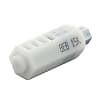
























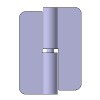
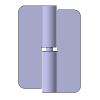




How can we improve?
How can we improve?
While we are not able to respond directly to comments submitted in this form, the information will be reviewed for future improvement.
Customer Privacy Policy
Thank you for your cooperation.
While we are not able to respond directly to comments submitted in this form, the information will be reviewed for future improvement.
Please use the inquiry form.
Customer Privacy Policy